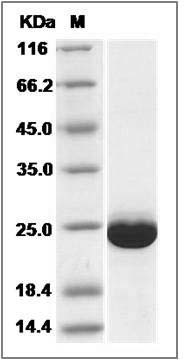-
Product Name
Human TCTP /TPT1 (His Tag) recombinant protein
- Documents
-
Description
Tumor protein, also known as TPT1, is a highly conserved protein among many eukaryotic organisms. Tumor protein is involved in a variety of cellular activities, including microtubule stabilization, calcium-binding activities, and apoptosis. The Mammalian translationally controlled tumour protein (TPT1) (or P23) is a protein which has been found to be preferentially synthesised in cells during the early growth phase of some types of tumour, but which is also expressed in normal cells. It was first identified as a histamine-releasing factor, acting in IgE +-dependent allergic reactions. In addition, TPT1 has been shown to bind to tubulin in the cytoskeleton, has a high affinity for calcium, is the binding target for the antimalarial compound artemisinin, and is induced in vitamin D-dependent apoptosis. TPT1 production is thought to be controlled at the translational as well as the transcriptional level.
-
Protein short names
TUMOR PROTEIN; P21; TRANSLATIONALLY-CONTROLLED TUMOR PROTEIN; TRANSLATIONALLY-CONTROLLED 1; TRT; FORTILIN; TRANSLATIONALLY-CONTROLLED 1; P02; TRANSLATIONALLY REGULATED TRANSCRIPT (21 KDA); RP11-290D2.1; TCTP; HRF; 21 KDA POLYPEPTIDE UNDER TRANSLATIONAL CONTROL; HISTAMINE-RELEASING FACTOR; TPT1; P23
-
Source/Expression Host
E. coli
-
Expression Plasmid/cDNA
A DNA sequence encoding the human TPT1 (Met1-Cys172) was expressed with a polyhistidine tag at the N-terminus.
-
Protein Species
Human
-
Molecular weight
The recombinant human TPT1 consists of 187 amino acids and predicts a molecular mass of 21.4 KDa. It migrates as an approximately 23 KDa band in SDS-PAGE under reducing conditions.
-
Purity
> 95 % as determined by SDS-PAGE
-
Validations

Human TPT1 / Tumor protein Protein (His Tag) SDS-PAGE
Related Products / Services
Please note: All products are "FOR RESEARCH USE ONLY AND ARE NOT INTENDED FOR DIAGNOSTIC OR THERAPEUTIC USE"
